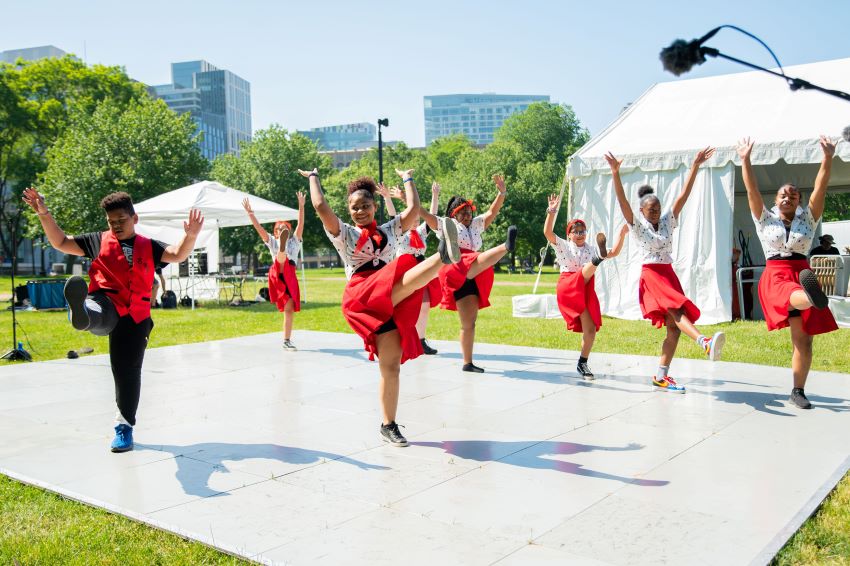Research & Insights / 15 Years of BPS Arts Expansion: Reflections from Arts Partners
15 Years of BPS Arts Expansion: Reflections from Arts Partners

In 2009, EdVestors launched Boston Public Schools (BPS) Arts Expansion, bringing together local foundations, the school district, arts organizations, higher education institutions and city government to create a coherent, sustainable approach to quality arts education for all BPS students. What was originally a three-year, $2.5 million effort is now in its 15th year, resulting in nearly 17,000 additional students annually now receiving arts education compared with 2009, and the number of BPS arts teachers nearly doubling.
To commemorate this milestone, we have asked some of our key BPS Arts Expansion collaborators, Brenda Rodrigues-Andujar, Deputy Director at Hyde Square Task Force, and Veronica Robles, Co-founder and Director of the Veronica Robles Cultural Center, to reflect on BPS Arts Expansion’s accomplishments.
What has been the impact of BPS Arts Expansion for you/your organization?
Brenda Rodrigues-Andujar: First, to be able to connect to more students and youth via the opportunity to get in front of people from the school. School partnerships, especially for creative youth development (CYD) organizations like Hyde Square Task Force, haven't always been easy to establish. [BPS Arts Expansion] was this space where we were able to connect.
Then I would say the opportunity, whether it be myself or my staff, to connect with other CYD partners and teachers of record to talk through what's working well and trends and issues that we're seeing. I'm thinking of just how crucial that was during the pandemic and post-pandemic to have these spaces.
Veronica Robles: Working in collaboration with BPS Arts Expansion has significantly impacted my private practice as a Mariachi singer-musician and in my organization, Veronica Robles Cultural Center, where we offer culturally responsive programming. As a performer, last year I had the opportunity to introduce my educational program to several East Boston schools, an endeavor I had pursued for a long time. My program includes live mariachi music with my mariachi ensemble, and an interactive Folklorico dance performance wearing colorful and authentic dresses
What changes have you seen in arts education in BPS because of BPS Arts Expansion?
BRA: Since the very beginning, EdVestors was at the forefront of leading this work. It [provided] thoughtful leadership and guidance in convening [together] which has gotten us to where we all are today.
I feel like serious [arts] positions within BPS were established because of [BPS Arts Expansion]. That is a testament to the work that EdVestors and the partners have done. BPS has taken steps to say [arts education] is important, and we need to make sure that this work recognizes that students have access to meaningful arts education.
There's [also] a level of ownership that the young people have. As a result of [arts education], our young people are engaged or dedicated to it. There's a seriousness of purpose. They’re like, “I get to be in this cool program and dance or do music or do theater, but I'm also getting something that's going to help me to be able to graduate or get through the school day.”
VR: BPS Arts Expansion has opened doors to artists like me who help enrich students' lives and knowledge about world cultures. As an artist and teaching artist, I have dedicated over 24 years to serving my community, creating programming, and activating spaces to share and celebrate Latino cultures in our community. Throughout this journey, I encountered numerous barriers. For many years, I made efforts to introduce my educational programs to East Boston Schools without success. This experience significantly influenced my decision to establish The Veronica Robles Cultural Center (VROCC). I am now truly honored and grateful for the opportunity presented to me as an artist, and to VROCC as an organization, to partner with BPS Arts Expansion.
Collaborating with BPS Arts Expansion signifies progress in the right direction and demonstrates our collective contribution to a more equitable system. It provides BIPOC artists like me with the chance to showcase our work to students who share our backgrounds, fostering mutual celebration and understanding of each other's cultures through songs, music, dance, and the arts.
What are your hopes and dreams for the future of arts education in BPS?
VR: I hope that organizations like Veronica Robles Cultural Center expand and continue their collaborative work with BPS to bring culturally responsive arts programming to our children.
I've envisioned for years the opportunity to collaborate with BPS to integrate my Latino Arts and Culture curriculum into the school hours as part of the Arts curriculum, encompassing dance, and mariachi music classes.
BRA: Having students have the opportunity to learn and develop skills, utilizing the arts that, whether it be in the now or in the future, is going to set them up for success. Many of those skills are transferable like being able to work with peers or being able to complete an art project from beginning to end. Whatever their path is after high school graduation, those are life skills that they take with them forever and are going to be invaluable. It’s important that our students continue to have a means and an opportunity to be able to express themselves and what they're feeling, and utilize the arts to be able to advocate for themselves.
Read the reflections of some of our collaborators from Boston Public Schools on the strides we have made together to improve arts education here and the reflections of community and arts education leaders on BPS Arts Expansion’s accomplishments.





